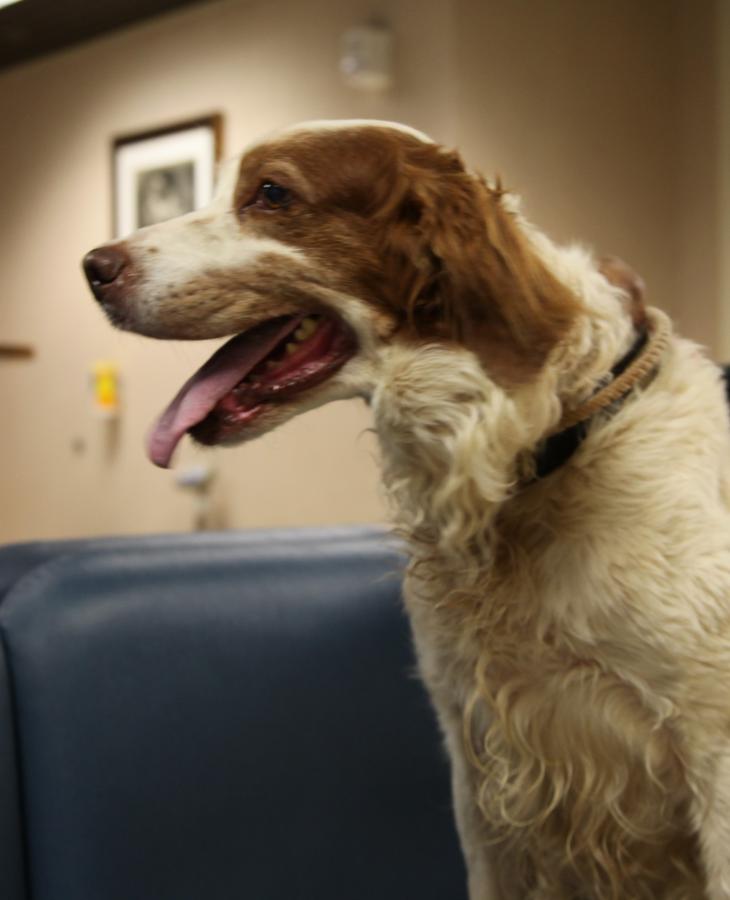
Summer Heat: Keeping Pets and Livestock Healthy
Sunday, August 2, 2015
Veterinary Viewpoints
Summertime in Oklahoma usually means high temperatures. It is important to keep pets and livestock properly hydrated and protected from the heat.
Dogs and Cats
Pets do not tolerate heat as well as humans. This is especially true for young, old or overweight cats and dogs. Brachycephalic breeds (pets with pushed in snouts) such as pugs, English bulldogs and Persian cats, are specifically prone to problems during the summertime.
Heat stroke is one of the most common problems pets face in the warmer weather. Signs of a heat stroke include:
Heavy panting and drooling
Unable to calm down, even when lying down
The pet’s gums may be brick red
Fast pulse rate
They may not be able to get up or stand properly
Here are some tips to keep your pet safe.
Never leave your pet unattended in a car. The interior of the car can heat up quickly and can lead to life-threatening situations for pets.
Heat stroke can cause brain damage, kidney failure and in more severe cases, death.
Limit exercise because the heat can cause further exhaustion. If you decide to go running, be sure that your dog has had the opportunity to slowly work-up to your pace.
If you want to take your pet for a run, go during the cooler times of the day such as in the morning or evening. Make sure to bring plenty of water for you and your pet.
On hot days, keep your pets primarily inside, in an air conditioned environment. If that is not possible, provide a shady and well ventilated spot for outdoor pets to help keep them cooler. Be aware that dog houses can become quite hot inside. Some pet owners also occasionally put ice cubes in their pet’s drinking water to help keep the water cool.
Another suggestion to keep large, outside pets cooler is to buy a small kiddie pool and fill it with cool water. This only applies to pets that enjoy the water. Adding ice cubes to the pool will give pets a cool place to rest on hot summer days.
Watch light-colored, hairless and shaved dogs as they can be prone to sunburn. To keep your pet safe, use a specific pet sunscreen to keep their skin healthy and sunburn free. Also, be sure to keep your pet’s paw pads off hot surfaces, such as hot asphalt, concrete surfaces and hot sand.
If you think your pet may be suffering from heat stroke, immediately move the pet to a cool surface and begin cooling the pet down with cool damp towels, ice packs and cool (not cold) water. Then seek immediate veterinary medical attention as a heat stroke can lead to severe organ dysfunction and damage.
Veterinarians will be able to help cool your pet down with intravenous fluids and other medical resources.
Horses and Livestock
Water is essential for body fluid balance and normal function of the digestive tract.
Pastured animals may benefit from access to a stock tank that is easy to clean. Stock tanks should be refilled a minimum of twice a week. Stock tanks that are refilled without cleaning often grow “slime” around the inside of the tank and may also provide breeding grounds for mosquitoes. Positioning your tank in a shaded area can also be beneficial.
A horse at rest in the heat of an Oklahoma summer may consume a minimum of 1 gallon per 100 pounds of body weight. That is a minimum of 11 gallons of water for a 1,100 pound horse.
Equine athletes require supplemental water for performance activities just like people. The primary method for cooling in the horse is sweating. Water is the basis for sweat. Horses need to restore their body water to prevent dehydration during exercise.
When traveling with your horse, you may find that bringing familiar water from home will encourage your horse to consume its necessary requirement.
Getting the maximum performance from horses is affected by training, quality of rider, footing, shoeing, nutrition, saddle fit and a myriad of other factors. To ensure that your performance horse is hydrated for maximum performance, make sure it has access to clean, fresh water.
by Elisabeth J. Giedt, DVM
Veterinary Viewpoints is provided by the faculty of the OSU Veterinary Medical Hospital. Certified by the American Animal Hospital Association, the hospital is open to the public providing routine and specialized care for all species and 24-hour emergency care, 365 days a year.
###
